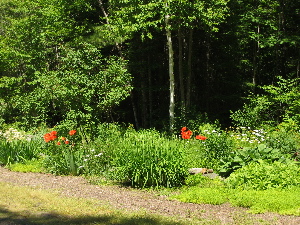THE AGING GARDNER
Well, I've begun the serious planning for my course on "THE AGING GARDENER; ACHES, PAINS AND CANES. ARE THEY COMPATIBLE WITH GARDENING?
I said I'd share some of my syllabus with you here, so let's take a look at the beginning.
We are living longer. Exercise is good for us. However, research shows that probably about 70 % of older adults are inactive!
• Gardening is considered low-intensity exercise!
• Exercise can help prevent coronary artery disease, high blood pressure, stroke, diabetes, depression, and even some cancers.
• By staying active we will reduce the limiting effects of those diseases that tend to limit us in our mature years like arthritis and osteoporosis. It will help us keep our balance and therefore reduce falls. It helps us keep our independence!
We’ve been gardening forever. Now our bodies don’t work right. What do we do?
• Don’t be discouraged.
• Use your head, not your back!
• Get a tetanus shot!
• Wait until after your morning cup of coffee. While having that, plan your attack!
• Preferably work hardest after a rain. The ground is easier to work.
• Define what it is you are limited by and then find the proper tools.
• Find a child to teach, and have them help you. A grandchild fits these criteria well!
• Don’t be afraid to try something new!
• Use groundcovers instead of grass to reduce the need for cutting the grass.
• If possible, leave “taxing” chores to others. (A spouse, child, grandchild, a hired hand, etc.)
• Try not to get frustrated. Stop before you get to that point and try something else.
• Define what you are going to do before you begin and don’t get sidetracked.
• Be organized. Treat gardening like driving to town. Plan your route and don’t have to backtrack. Put the wheelbarrow, wagon or cart to use. Take everything you need with you so you don’t need to go back to the garage. IMPORTANT: BRING WATER TO DRINK!!!
• Don’t get discouraged. Look for success in small tasks.





7 Comments:
Some really good points here. One that I need to follow is having a plan and sticking to it. I tend to start working in one area, then think of something else that needs doing somewhere else, and off I go, with the first job not finished (nor several which follow). Some days I do far more walking than working in the garden, and my knees let me know all about it.
I used to get so tired of spending forever collecting small tools like secateurs, trowel, fork, gloves, etc. and then trying to look after them all in the wheelbarrow when I was deadheading, weeding or pulling out old plants. There was always the chance that I'd tip them into the compost heap, too. So recently I made a simple bag about 14 inches wide and 10 inches deep, with long ties attached at either end of the side that is open. I can tie it to the handles of the wheelbarrow and never lose the tools amongst the rubbish now.
Alice, thank you! That's such a great idea! I may add that suggestion to my course if that's OK with you? I'll tell people I got it from you, on-line.
NCMG - certainly you may use this hint in your course. I will take a photo later in the day and email it to you. I'm really enjoying what you write about gardening for the oldies and 'approaching oldies'. I sometimes say to my husband, "Just think what we could do now if we were 20 years younger."
My suggestion is sort of the opposite of Alice's. I say, mix it up. I find that if I hold any position too long that I get stiff and sore. So I might weed for five minutes and fill a small basket, then stand up and walk over to the mulch and empty the basket. This gives me the chance to stretch my arms over my head and shake out my hands before going back to weeding.
An excellent book on this same subject is "Gardener's Fitness: Weeding Out the Aches and Pains" by Barbara Pearlman.
Hi Sinclair,
I've added your comment to my syllabus. Thanks! I'm sure there are others who "stiffen up" and need a break to loosen those joints up again. We all have different issues, don't we?
One rule that I've made for myself is to NEVER use power tools (garden or otherwise) if I'm tired, hungry, angry, frustrated or distracted in any other way.
Thanks Urban Agrarian! That's a very sound suggestion! I've added that to my syllabus as well. It's amazing how many really GOOD suggestions I've gotten. Sharing this with my readers was obviously a wonderful idea.
Thanks to all of you!
Post a Comment
<< Home